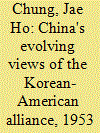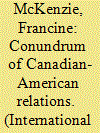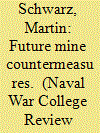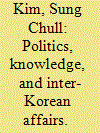| Srl | Item |
| 1 |
ID:
130416


|
|
|
|
|
| Publication |
2014.
|
| Summary/Abstract |
This article reconstructs an ideational trajectory in which China's views of the Korean-American alliance evolved during the last 60 years. The article first surveys China's general policy toward alliance and alliance-making. The article then traces the evolutionary path of Chinese views in the following four periods: (1) the Cold War era (1950s-1960s); (2) transformative years (early 1970s-mid-1990s); (3) the period of a strained alliance (late 1990s-late 2000s); and (4) an era of great reversal (late 2000s-present). Principally, the article suggests that China's view of the Korean-American alliance was intense antagonism during the Cold War era, although it was significantly watered down during the transformative years of Sino-South Korean rapprochement. With the normalization of relations between Beijing and Seoul in 1992 and a decade of progressive rule (1998-2007) in South Korea, China's view encompassed some wishful thinking about a gradually diluted alliance. The strong comeback of the conservatives in South Korean politics since 2008, however, shattered such optimism and re-awoke Beijing to some cold realities. China's view of the Korea-American alliance may grow more negative in tandem with US-China relations, irrespective of the official rhetoric of sovereignty regarding alliance and alliance-making.
|
|
|
|
|
|
|
|
|
|
|
|
|
|
|
|
| 2 |
ID:
129554


|
|
|
|
|
| Publication |
2014.
|
| Summary/Abstract |
Forty years ago, political scientist Denis Stairs published The Diplomacy of Constraint, an account of Canadian involvement in the Korean War. Stairs explored the attempts of Canadian politicians, diplomats, and bureaucrats to constrain US intervention in Korea and, more generally, to influence the conduct of its foreign policy in the pressurized context of the early Cold War. Since then, historians and political scientists have continued to publish accounts of Canadian involvement in the Korean War and books on Canada-US relations in general. Why, then, should someone read The Diplomacy of Constraint today when there are more recent analyses? This review essay attempts to explain the longevity and usefulness of Stairs' study. What have scholars learned from Stairs' interpretation and approach? Has he influenced subsequent academic analyses? Can his study be considered a model of interdisciplinary scholarship? Finally, is new scholarship intrinsically better than old?
|
|
|
|
|
|
|
|
|
|
|
|
|
|
|
|
| 3 |
ID:
127228


|
|
|
|
|
| Publication |
2014.
|
| Summary/Abstract |
This study aims to examine the energy efficiency of the manufacturing industry of Korea by using the extended Divisia index decomposition of Choi and Ang (2012). First, we applied the Sato-Vartia index decomposition to the energy intensity of the manufacturing industry in Korea. Second, we attributed the growth rate of aggregate energy intensity to 10 sub-manufacturing industries through two channels: real energy intensity and structural change. The result of the decomposition illustrates that the aggregate energy intensity index decreased in the period 1981-2010. The index decomposition analysis demonstrates that real energy intensity decreased by 85.85%, whereas structural change increased energy intensity by 69.37% over the same period of time. The negative effect of structural change is partly a result of the increasing portion of energy intensive industry in manufacturing. The result reflects that industrial structure in Korea can be an important aspect for improving energy efficiency.
|
|
|
|
|
|
|
|
|
|
|
|
|
|
|
|
| 4 |
ID:
133067


|
|
|
|
|
| Publication |
2014.
|
| Summary/Abstract |
Admiral Smith's point might be as valid today as it was sixty-four years ago. It refers to mines that he faced off the coast of Korea. Naval (or sea) mines are, by themselves or in combination with other weapons, a promising choice to parties pursuing antiaccess/area-denial objectives. The number of mines in the stocks of countries around the world and the ease of laying them mean that sea control is very likely to be lost again in future tension and conflict. This article is an attempt to describe the means, and to some extent the methods, under consideration to win it back if the need arises again. Mines pose a threat not only to military use of the sea but also to civilian shipping. The global economy depends on secure access to the global commons. With roughly 95 percent of world trade being shipped by sea, it is clear how much the economy depends on open trade routes and sea areas.1 Therefore, the capability to counter mine threats is needed to provide freedom of movement not only to one's own and friendly naval forces but to merchant shipping as well.
|
|
|
|
|
|
|
|
|
|
|
|
|
|
|
|
| 5 |
ID:
130623


|
|
|
|
|
| Publication |
2014.
|
| Summary/Abstract |
There were four critical undercurrents for the growth of Korean think tank in the 1990s: democratization. the end o/the Cold War. _globalization coupled with local autonomy, and the expanded government budget accompanying Korea's rapid economic growth. In contrast to American think tanks which are private but normally server as public policy advocates, most of the important Korean think tanks are supported by the government and they are not independent public policy advocates. the Korean think tanks are highly susceptible to domestic political dynamics for instance, the presidential office's power over the over the appointment of directors.
|
|
|
|
|
|
|
|
|
|
|
|
|
|
|
|